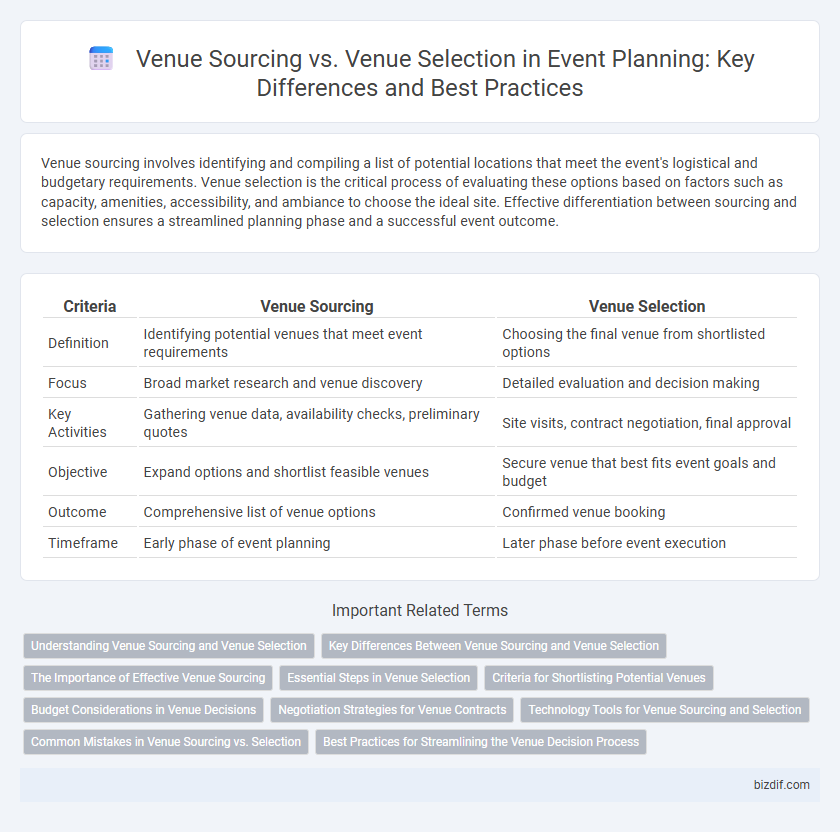Venue sourcing involves identifying and compiling a list of potential locations that meet the event's logistical and budgetary requirements. Venue selection is the critical process of evaluating these options based on factors such as capacity, amenities, accessibility, and ambiance to choose the ideal site. Effective differentiation between sourcing and selection ensures a streamlined planning phase and a successful event outcome.
Table of Comparison
| Criteria | Venue Sourcing | Venue Selection |
|---|---|---|
| Definition | Identifying potential venues that meet event requirements | Choosing the final venue from shortlisted options |
| Focus | Broad market research and venue discovery | Detailed evaluation and decision making |
| Key Activities | Gathering venue data, availability checks, preliminary quotes | Site visits, contract negotiation, final approval |
| Objective | Expand options and shortlist feasible venues | Secure venue that best fits event goals and budget |
| Outcome | Comprehensive list of venue options | Confirmed venue booking |
| Timeframe | Early phase of event planning | Later phase before event execution |
Understanding Venue Sourcing and Venue Selection
Venue sourcing involves researching and identifying potential sites that meet an event's specific requirements, such as capacity, location, and amenities. Venue selection is the decision-making process where planners evaluate sourced venues based on cost, availability, and suitability to finalize the best option. Understanding the distinctions between sourcing and selection ensures efficient event logistics and maximizes attendee satisfaction.
Key Differences Between Venue Sourcing and Venue Selection
Venue sourcing involves identifying and gathering a list of potential venues that meet the event's requirements, focusing on availability, capacity, and location. Venue selection is the decision-making process where criteria such as budget, amenities, and vendor compatibility are evaluated to choose the best fit from the sourced options. Key differences lie in sourcing being a broader search phase, while selection centers on detailed assessment and final commitment.
The Importance of Effective Venue Sourcing
Effective venue sourcing is crucial for successful event planning as it ensures the identification of locations that align with the event's goals, budget, and audience size. By thoroughly researching and comparing multiple venues, planners can uncover hidden value and negotiate better terms, which directly impacts the overall cost-efficiency and attendee experience. Well-executed venue sourcing streamlines the selection process, reducing risks and allowing for strategic decisions that enhance event outcomes.
Essential Steps in Venue Selection
Venue sourcing involves identifying a broad list of potential locations through research and referrals, while venue selection focuses on narrowing options based on criteria such as capacity, accessibility, amenities, and budget alignment. Essential steps in venue selection include site visits to evaluate logistics and ambiance, verifying availability and contract terms, and assessing technological capabilities like AV equipment and internet connectivity. Prioritizing these factors ensures the chosen venue supports event goals and delivers a seamless attendee experience.
Criteria for Shortlisting Potential Venues
Criteria for shortlisting potential venues in event planning involve analyzing factors such as location accessibility, capacity alignment with guest count, and available amenities like audio-visual equipment and catering options. Budget constraints and venue availability on desired dates also significantly impact the selection process. Evaluating venue reputation and past event reviews further ensures an optimal match for the event's goals and audience experience.
Budget Considerations in Venue Decisions
Budget considerations play a crucial role in venue sourcing and venue selection, directly impacting the feasibility of event options. Venue sourcing involves gathering a wide range of potential locations that fit preliminary budget criteria, allowing for cost comparison and negotiation opportunities. During venue selection, detailed evaluation of fixed and variable costs, such as rental fees, catering, and audiovisual equipment, ensures the final choice aligns with the overall event budget and maximizes value.
Negotiation Strategies for Venue Contracts
Effective negotiation strategies for venue contracts involve thorough venue sourcing to compare diverse options and leverage competitive pricing. Detailed analysis of contract terms during venue selection ensures favorable conditions, including flexible cancellation policies, clear payment schedules, and included amenities. Engaging in transparent communication and securing written agreements mitigates risks and maximizes value in event planning.
Technology Tools for Venue Sourcing and Selection
Technology tools for venue sourcing streamline the discovery of event spaces by aggregating comprehensive databases with real-time availability, pricing, and capacity filters tailored to specific event requirements. Advanced platforms employ AI-driven recommendations and virtual tours, enhancing decision-making efficiency in venue selection by matching event criteria with optimal locations. Integrations with booking systems and CRM software further simplify contract management and communication, ensuring seamless coordination throughout the event planning process.
Common Mistakes in Venue Sourcing vs. Selection
Common mistakes in venue sourcing include overlooking critical factors such as capacity limits, accessibility, and budget constraints, which can result in unsuitable options. In venue selection, errors often arise from insufficient site visits and ignoring contract details, leading to unexpected costs and logistical challenges. Understanding the distinction between sourcing a broad range of possible venues and selecting the final location is crucial for successful event planning.
Best Practices for Streamlining the Venue Decision Process
Efficient venue sourcing involves comprehensive market research and leveraging technology platforms to quickly identify multiple suitable locations based on event requirements and budget constraints. Venue selection emphasizes evaluating key criteria such as capacity, amenities, accessibility, and vendor compatibility to ensure alignment with the event's goals. Best practices include creating a standardized checklist, conducting site visits, and obtaining stakeholder feedback to streamline decision-making and minimize risks.
Venue sourcing vs Venue selection Infographic

 bizdif.com
bizdif.com